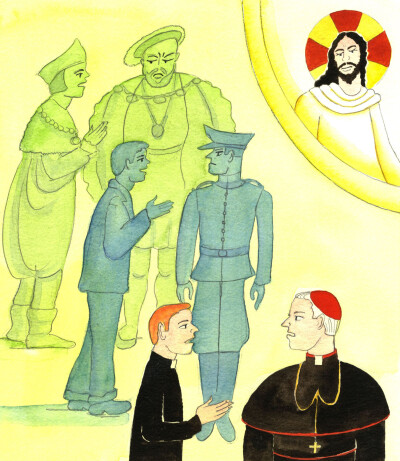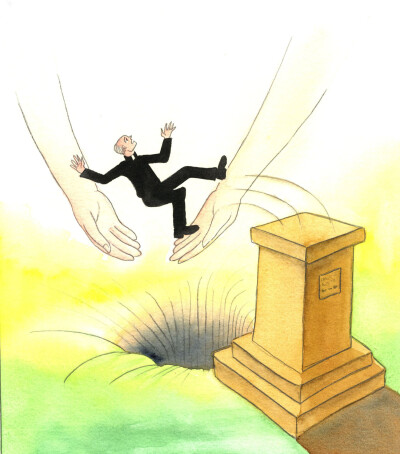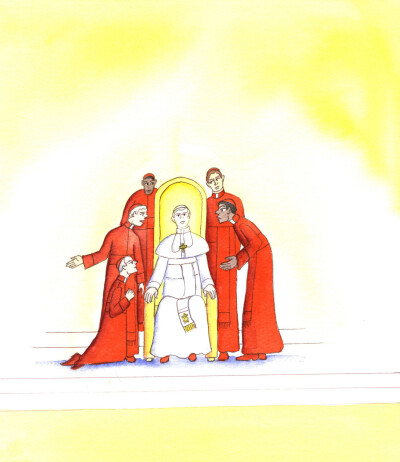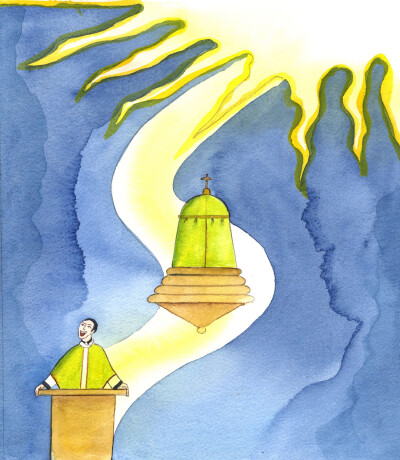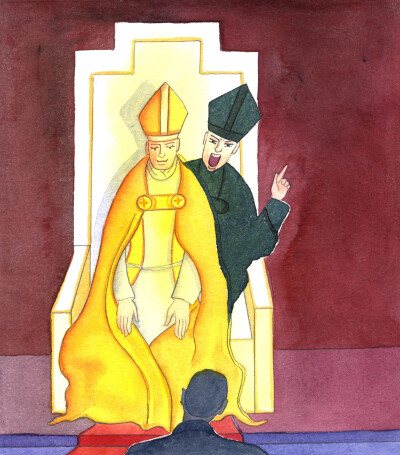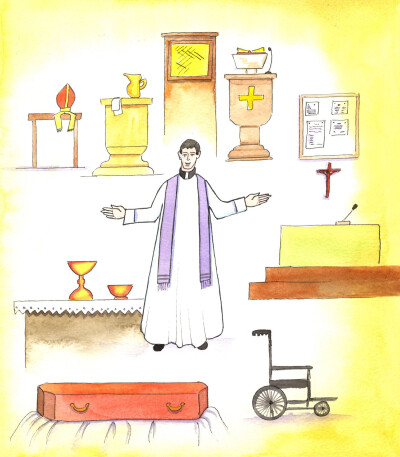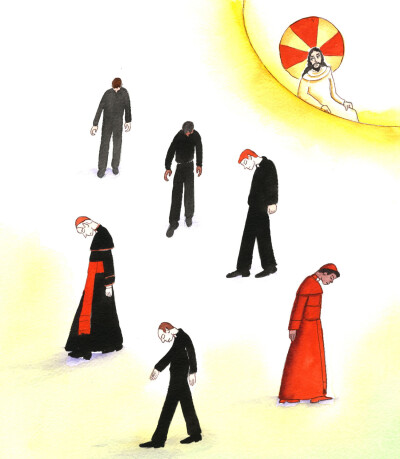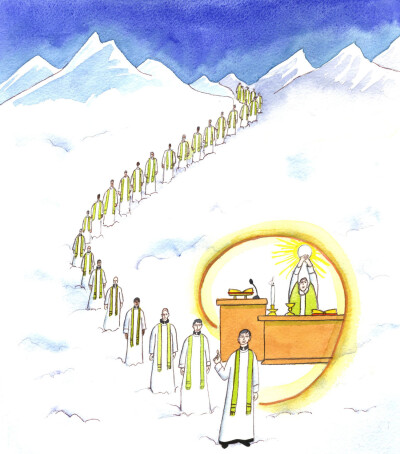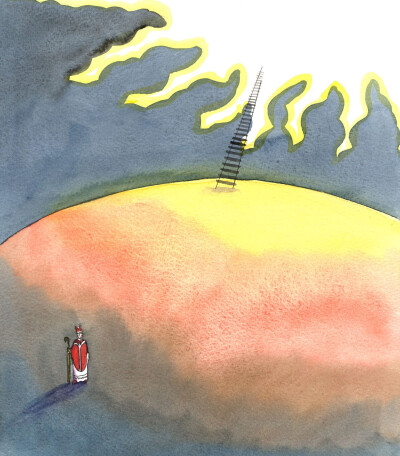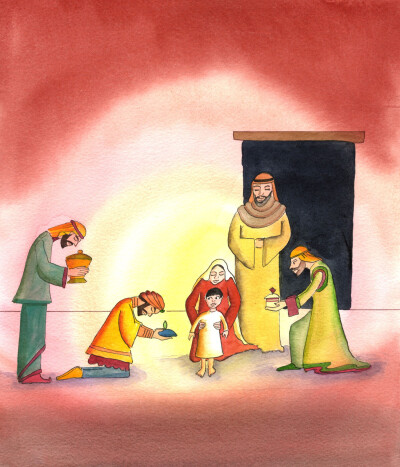Search Page
Showing 81 - 100 of 106
It is Satan who helps some of the Clergy to water down the Faith, and to act against the Faith in ways that others do. Christ sees it is as hard for an orthodox priest to speak with a luke-warm Bishop today as it was for Franz Jaggerstatter to speak to the army officer, or St. Thomas More to speak to his king.
It can be hard for some priests as they grow old and frail, and step down from positions of influence, no longer able to preach and command a hearing. Some feel as though, in retirement, they are falling, helpless, towards oblivion; but they should believe that, underneath them, to hold them, are the 'everlasting arms' of God.
Priests should set an example of holiness and purity, neither giving up nor watering down the Faith, nor developing a worldly spirit in order to be popular. They will do little good if they are disloyal to the Saviour, Who asks them to imitate Him, and keep people safe from Hell.
It is a marvellous thing, to teach, preach or evangelise. Just as there are dark streets and alleys where no-one feels safe, and sensible people are glad to be shown the way to the well-lit reads nearby, so, in the moral sphere, wise people respond to any invitation to leave the dark paths on which they walk at present, to enter the Way of Christ, which is the sure way to Heaven, lit by Divine Light.
Christ said: 'Eat what is set before you. Take no spare tunic'; so when Christ sent out His disciples to preach the good news of the Kingdom, He gave them precise instructions, to help them. He can not fail to help those He chooses, and sends out, even today, even if the circumstances, and the instructions, are different.
Many Catholics practice what must be called false ecumenism. A Catholic priest or Bishop acts against the truth if he stands with a Protestant leader and gives what is called a joint blessing. This gives the impression that they each have the same power and authority. And when a Protestant minister is invited to offer a sermon during a Mass, this is against the wish of Christ and His Church. It is forbidden.
Faithful Catholics must continue to be brave and vigilant. Life in the Church has been endangered for two generations, undermined by dissent and watered-down preaching, and false notions of pastoral care; and Catholics who have pointed out the danger - like people revealing a dangerous degree of subsidence next to a Cathedral - have been ostracised, and labelled as 'prophets of doom'.
Bishops are appointed to teach, and to lead the Church in prayer. When the Pope's advisors are discussing which men might be appointed as Bishops, it is not enough for anyone to say that a certain man is very 'pastoral', if he is not also doctrinally-sound in his beliefs, and fervent in ensuring the reverent conduct of the Sacred Liturgy.
It is good that the Pope is advised by a group of colleagues as he chooses men to be Bishops. It is not enough for men to be known as good 'pastoral' men, if they are unsound on doctrine or lack concern for the reverent conduct of the Sacred Liturgy.
We should focus on the tabernacle, and, through it, to Heaven, if strange or distorted things are heard in church from the pulpit. We can be certain that the Father has given Christ to us, Who has spoken all His Father wants us to know; and we can rely on the Church's teaching, given through the Pope and the Catholic Bishops, easily found in our Catechism. We must be confident that the truth has been handed on, and can be known.
By our Baptism we leap over a wall, it seems, that separates the holy from the unholy, no longer being stained by original sin. But the city beyond the wall represents earthly life, through which we should travel without being enslaved by sin. Heaven lies ahead, for the faithful, hence the importance of good preaching, as the clergy urge people not to grow weary, and never to betray Christ. Only the holy can enter Heaven.
Christ looks down from Heaven, and notices the great silence in the Church, as few women show concern about their own contraceptive use, only a small number defend the Church's teaching on sexual morality, and many clergy are silent on the subject, preferring to preach about other less challenging issues.
The Clergy sometimes, individually, make mistakes. We are right to respect the man and his office, and to accede to his wishes in the service of God, the Church and our neighbour. We should act with truth and charity towards him; but we are not obliged to believe the personal opinions he expresses if he is in error or offends against charity. A bishop in error confuses us by confusing two contradictory messages: his own, and also the one that he should embody as our Shepherd who guides, teaches and governs in the place of Christ.
The priest is the man at the heart of the process of conversion. He brings good news about God's love, and the forgiveness given to repentant sinners. He brings Jesus to us: in His Word, in the Real Presence of Christ at Mass and in the tabernacle. He organises Catechesis; and he preaches, offers the Holy Sacrifice, prepares us for death, guides and helps the bereaved - and the faithful priest will be marvelously rewarded, even in this life. His greatest friend is Jesus Christ.
Amongst faithful priests there are others who act with timidity or cowardice. People complain when priests are guilty of sexual immorality; yet Christ sees something scarcely less sinful in His sight as He watches priests who have their heads down, as they avoid giving clear teaching on sexual morality; in this way they fail to give the guidance they have been called to give, and fail to lead sinners away from their sins.
In every age, since the time of the Apostles, priests have faced opposition and persecution as they have gone about their work. It is important that they are faithful to preaching the truth - the Faith in its entirety - and faithful to the Mass. That is his task: to teach the faithful how to lead good lives and prepare for Heaven, and to feed the faithful with Jesus Christ's Sacred Body and Blood: to transform them.
Any priest or bishop who makes compromises in his teaching or example, to fit into society, is as if living in semi-darkness; and to die in that state is to be far from the 'ladder' which represents a swift ascent to Heaven for those who have lived in the light.
Christ was introduced to the world, even as a child, because He is King: the Divine child Who would sacrifice His life for sinners, and then conquer sin and death by rising from the grave. The Early Church spent many years preaching about Him, and defining His two natures, and His Mission. Only much later were definitions made about His mother's Immaculate Conception, and her Assumption. Yet the time is ripe for confirmation, in a formal declaration, of two other titles: Co-Redemptrix, and Mediatrix of all Graces.
The view from Heaven: Christ, looking down at the world, sees his priests as 'other Christs', each a visible 'embodied' Christ in a particular place on earth, each chosen and made ready to sanctify the Faithful and to teach those who do not yet know Him, each one visible, truth-speaking, kind, prayerful, and trusting in the Father's plans and the Spirit's power.
What is Mary Like? by Elizabeth Wang
This text is the complete version of the pamphlet WHAT IS MARY LIKE?
“Now having met together; they asked him, ‘Lord, has the time come? Are you going to restore the kingdom to Israel?’ He replied,…
Showing 81 - 100 of 106

